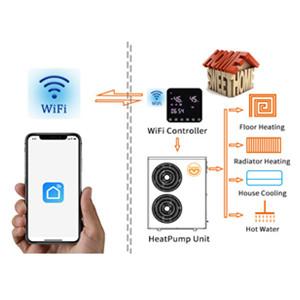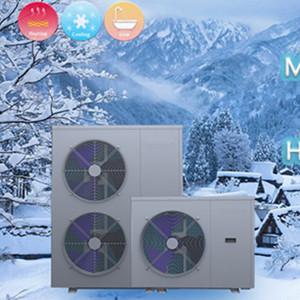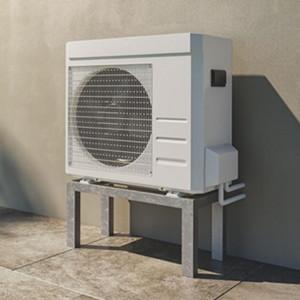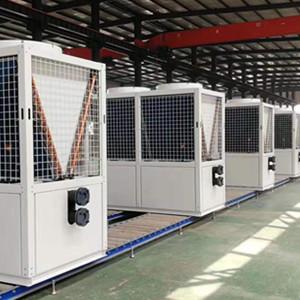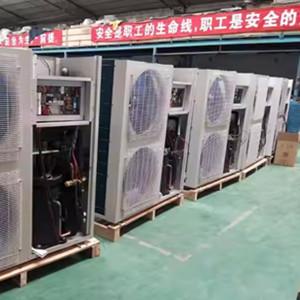Air Source Heat Pump Efficiency at Low Temperatures
Heat pumps are one of the best and most cost-effective alternatives to traditional heating methods. They tend to reduce your impact on the environment by producing significantly fewer emissions. They can even be powered with renewable energy, so you can take a more eco-friendly way to heat your home and/or water. However, it has been noted that warmer weather may be better for these systems, while cooler temperatures reduce their efficiency. Much depends on the type of heat pump you are using, which is why this page is here to help you choose.
How a heat pump works
Heat pumps use heat from the air or the surrounding ground as the primary energy source. They use a small amount of electricity to extract this energy from the surrounding environment and into a heat exchanger, sometimes called an evaporator. Inside this heat exchanger, heat is absorbed by the refrigerant, which evaporates and turns into a gas. Refrigerants absorb heat even at extremely low temperatures of -20°C, which is why heat pumps are able to work in cold climates.
This evaporated refrigerant is then compressed, which further increases the temperature. The gas can then transfer its heat to your home's central heating system. When this happens, the refrigerant gradually cools until it condenses into a liquid again. This happens in the second heat exchanger, also known as the condenser. Inside the condenser, the cooler water from the central heating system can continue to absorb any heat, which is then delivered to your home through any radiators or underfloor heating. Alternatively, it can be used to supply hot water to your faucet through the cylinder.
Finally, the cooler refrigerant passes through the expansion valve. The pressure drops, the refrigerant returns to the evaporator, and the whole process starts all over again.

How good is a heat pump in cold weather?
Now that you know how a heat pump works, you may still be wondering how the system gets heat from the ground or from the air when the temperature is below zero.
The ground temperature will usually not fall below 10 °C. While this may not be warm to us, a heat pump can still absorb some heat to warm your home. Even with an air source heat pump, ambient heat can be used. Remember that Celsius is an artificial scale, and zero degrees does not mean that there is no heat in the air at all. If the heat is zero, the temperature of the earth will reach -273.
As long as you buy the right one, your heat pump will keep working in cold weather. Every heat pump is different and you will need the right equipment to ensure your home can be heated throughout the winter. For temperatures in the UK, this may not be as big as some places like Canada or North America where temperatures can drop to -30 °C.
How efficient is a heat pump in cold weather?
Your heat pump won't work as well in colder temperatures as it will in milder conditions. More power may be required to remove heat from the air, which leads to lower efficiency.
Heat pump efficiency is measured using the coefficient of performance (CoP). This is calculated by comparing the input quantity with the output quantity. For example, if an air source heat pump uses 1 kW of electricity to generate 3 kW of heat, the CoP is 3. The higher the CoP, the better, as it indicates that your heat pump is more efficient.
If you do live in a very cold climate, you may benefit more from a ground source heat pump. This is because the ground temperature tends to be higher than the air temperature. Therefore, a ground source heat pump may require less electricity to operate and can generate more heat.
With an outside temperature of 8.3 °C, your heat pump can achieve around 3.8 CoP. However, if the temperature drops to around -8.3 °C, your heat pump efficiency may drop to around 2.3 CoP. If the outside temperature drops too low for your heat pump to generate any heat, you may need a backup. This is unlikely to happen in the UK, however, heat pumps in countries like Canada may need to rely on backup. This can get expensive, so if you live in an extremely cold climate, a heat pump may not be the most efficient way to heat your home.
If you take care of it, your heat pump will remain efficient for longer. You should ensure that your system is maintained every 12 months. Not only will this keep everything running safely, but you'll also be happier knowing that your heat pump will be able to heat your home all winter long. If you have an air source heat pump, you should remove any debris from the area to prevent airflow obstruction. This may reduce the efficiency of the heat pump. You may also want to check the filter regularly and replace it if needed, any maintenance is best done by a qualified engineer.
